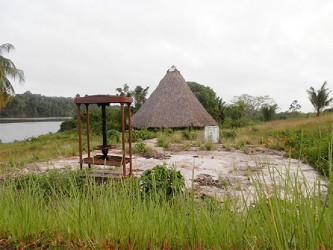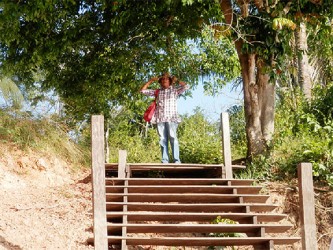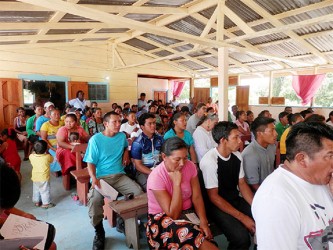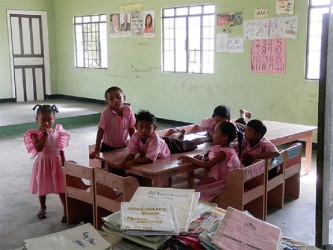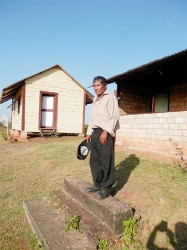There were tears, raised voices, accusations, counter-accusations and promises of money. It was a new venture and not everyone was happy with the way it was going.
Like the Essequibo River, running dark and deep just 200 metres away in this jungle village in Region Nine, the undercurrents ran deep at the meeting hall in Apoteri. For this indigenous community, isolated in the jungle, far from most everywhere, but surrounded by pristine wilderness and abundant wildlife, tourism, more specifically, eco-tourism, seemed the direction in which to go.
But a few had already taken that leap. And as the meeting progressed one morning in September, it was clear that a majority of villagers were not happy with the status quo. A village leader and his daughter who ran the operation were accused of looking after their own interests and not the village’s.
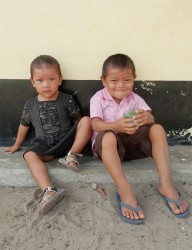
(Photos by Gaulbert Sutherland)
“The tourism process that is here, it is not transparent as yet because it is not coming through the village (council),” one man asserted saying that there are no rules. “Our resources are there but…it is not coming through the right process,” he said. Another referred to the father/daughter tourism venture and said that the community does not have a say in it. “The people come in plane…just jump in boat and gone right up…they come back, jump in the plane and gone,” one villager remarked. “What are we getting?’ he questioned. “Nothing.” Others also expressed their concern.
The woman who runs the business defended it and said that the village benefits through taxes. After a strenuous defence, she sat down in tears. Steve Yatomi of the International Game Fish Association attempted to appease the villagers. He explained that it was just sport fishing with lures and said that villagers will be employed. He said he came on his own dollar “to help out” and was willing to work with the villagers to sort out their issues.
“The village gets about US$5,000 per group of eight persons,” he said. “We’re here for sustainable tourism.”
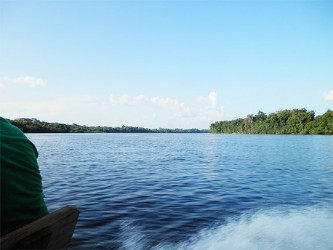
Another villager said they understand but they want things to be done the right way and the village council should be involved. He said he heard the money being talked about and if it had indeed been handed to the council, then the village should have progressed.
Apoteri, with its varied and abundant wildlife also wants to build up an eco-tourism business but the progress has been halting. It has a guest-house which was previously used by the private operator but with rising tensions, this appeared to have halted.
The community on the western bank of the Upper Essequibo, once booming because of the balata trade, is looking to ecotourism as its new hope. But it has not come without controversies.
Sitting on the banks of two rivers: the light waters of the Rupununi River slip into the darker waters of the Essequibo River here, Apoteri had a population of 288 persons – a mixture of indigenous Macushi and Wapishana peoples.
However, the name Apoteri reportedly comes from the Arawak name of a tree. The history of Apoteri is closely tied to the balata industry and remnants of what was once a thriving industry can still be seen. An old balata presser, an abandoned safe, a concrete floor, a long-empty swimming pool and assorted broken machinery are the only remnants of a once thriving town through which sometimes hundreds of people passed. There was even a cinema.
Now, the village is quiet and placid, much like the river in the dry season and despite the undercurrents, life progresses in a steady way in this isolated community where the only means of rapid communication with the outside world is a two-way radio.
Sherry Simon, 21, a teacher at the Apoteri Nursery School said that her great grandparents were among the first who settled in the village. “They had some flooding and so and they decide to come up here,” she said. She is a mixture of Macushi and Wapishana and said
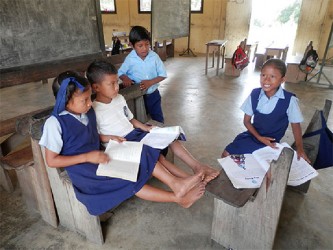
that her Wapishana relatives had come to do balata bleeding and settled there ever since.
Sherry went to the St Ignatius Secondary School on the outskirts of the regional capital Lethem and said that she mostly misses only the mobile communications. “We have everything here that we really need,” she said pointing out that persons sell farine and fish and other agricultural produce to earn an income. To relax, she said, they go upriver, sometimes to the waterfalls and also fish. Many of the villagers keep their traditional ways and, for example, the Wapishana people teach their children to speak Wapishana, she said. There are two churches in the community: A Catholic church and a Christian Brethren church, as well as two shops.
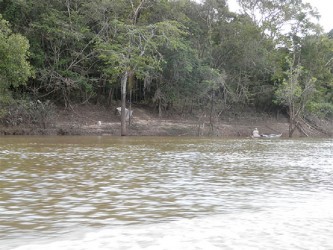
Sherry said she would like to see better health care in the community, more children going to secondary school as well as phone service.
Headmaster of the Apoteri Secondary School, Alan Edwards had more pressing needs. He started teaching in 1986 and oversees the 62 primary school students with the assistance of two teachers. He said the school needs to be repainted and there is need for more and proper furniture. The school has a computer but cannot use it because, while there are solar panels to provide energy, the battery no longer works. He said that he has requested that it be replaced. “I requested for it long but nothing has happened,” he said. When asked how long ago, he said it was about two years ago. The computer sits on the top of a cupboard, covered and unused. For two years too, a solar pump to provide water for the school has not worked. The solar panels are set-up, untouched while the black tanks sit on their trestle unused. No one steals anything.
As he watched the children practice for their school sports, Edwards said he was happy that many of them succeed in their exams and go on to attend the secondary school at Annai. He said he would like his teachers to gain further training.
Edwards was originally from Yakarinta and came to Apoteri when the then headmaster requested a staff member. “That is how I end up here, I came to assist him,” he said.
“Life is simple” in Apoteri, the headmaster stated. He said once you could fish and farm, getting food is easy and people are cooperative. “Life simple for me. It’s not hard. You don’t have to buy your own food and so,” he remarked.
Apoteri is where Bertina Domingo, one of the young girls who survived for over a month in the jungle 19 years ago, lives. Like everybody here, though she has been designated a national heroine, she too lives quietly.
But change is coming to the community. More and more, the villagers hear about the logging operations and mining operations that are coming closer and closer. The Baishanlin logging concession is 200 metres away from Apoteri on the other side of the Essequibo
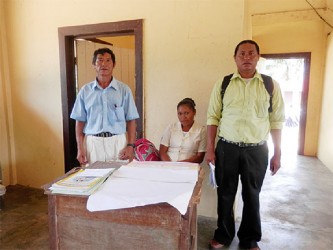
River. Many are worried and many want more information.
“They simply telling you they don’t want the company to enter land that they are using,” Dale Edwards told a meeting on the Baishanlin project recently. He spoke of the community’s ecotourism aspirations.
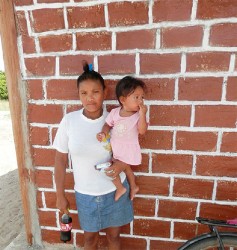
“We are now going to tourism,” the leader of the village Campbell James said. He said the tourists who have already visited the area love it and he pointed to the pristineness of the areas as well as the varied and abundant wildlife. He feels logging and mining operations will disturb the community’s business as well as well as impact on the sustainability of their way of life.
